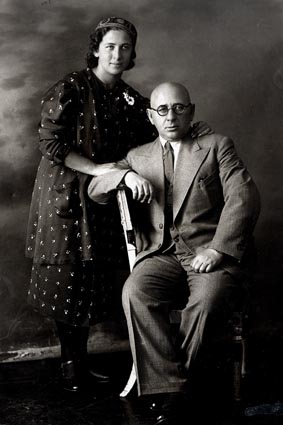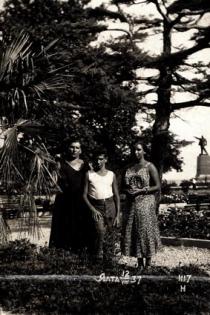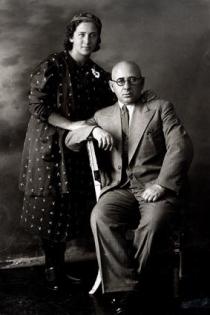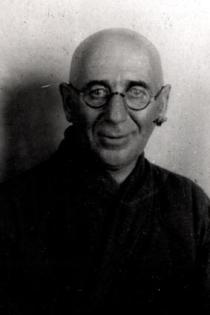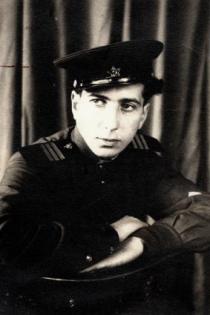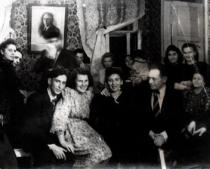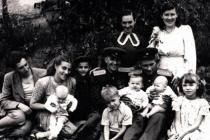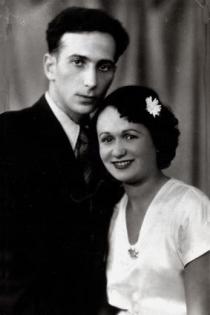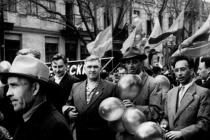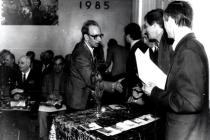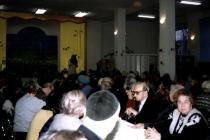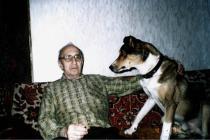This photograph was taken in Leningrad in 1940.
You can see my sister Zhanna and our father.
Here I’d like to tell you about her and about our life before the war.
My sister Zhanna was born in Opochka in 1920. She got no special education (only a secondary school). She studied in Opochka, and continued in Leningrad.
Later Zhanna worked as a technician at some institution. She was married, but had got no children. My sister died in 2004 in St. Petersburg. Since our childhood we were not very close: we had different friends, different circles of acquaintance.
In Opochka there lived many Jews. They lived not separately; there were no special Jewish residential areas. Jews were engaged in different professions, I mean there were no specific Jewish occupations.
I do not know why father decided to leave Opochka for Leningrad. We moved in 1930, when I was only 6 years old.
My uncle and aunt remained in Opochka and died there. For a short period of time we lived in the suburb of Leningrad (in a small settlement, I do not remember its name), but then arrived in Leningrad. We settled in a communal apartment in the city center.
Father worked, and Mom kept the house. Our apartment was very large: a lot of families lived there. Mom worked hard at home: in communal apartments neighbors were on duty in turn. It meant that each family had to clean the apartment during a certain period of time: a week per each family member.
We were 4, therefore Mom had to clean the kitchen, the long-long corridor, the bathroom, the toilet the whole month. She also had to solve all the problems with food: it was not easy to buy food (because of its shortage). Mom often had to stand in line to buy this or that. Don't forget that at that time there were food cards!
I remember that some time later we moved to another apartment: also communal and also very large. I lived in communal apartments till 1985, when authorities gave me this flat (it happened because I was a disabled former soldier). And Mom remained a housewife till my father's death. After that she started working as a news vendor.
Our family had little money, but we were used to good food and dressed with the best. Mom was a very good housewife: she always knew where it was possible to save money. In my opinion, at that time all families were in the same boat, at least the families around us.
At home we had not many books. I remember my father reading a newspaper, but I never saw him or Mom with a book in their hands. As for me, I acquired a taste for reading being already adult. I even finished courses for bookbinders. But I'll tell you about it later.
I do not remember my parents discussing any political events. Perhaps they were not interested, but probably they did not want to talk about it in presence of children. Therefore I know nothing about their attitude to the communist regime.
My parents were not religious people in full sense of this word. But they celebrated Pesach and Chanukkah every year. Mom usually cooked very tasty gefilte fish and a lot of guests came to our place. It is interesting that we never published the cause of our meetings.
Our neighbors thought that we celebrated our family dates. I do not know whether my parents attended a synagogue. For some reason it seems to me that they did, but kept it from children. I guess they were afraid that we could let the secret out: Soviet authorities struggled against religion.
Yiddish was my parents' mother tongue, but to tell the truth, they spoke Yiddish only when it was necessary to keep something from me and my sister. Most of my parents' friends were Jewish.
In summer we usually went to Opochka, where my uncle and aunt lived. In summer of 1941 we also were going to visit them, but the war burst out.
